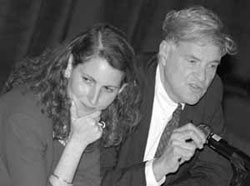Homecoming Panel Focuses on Education at the Crossroads
The program, entitled, "Education at the Crossroads," was introduced by Darlyne Bailey, Vice President for Academic Affairs and Dean. The principal speakers were TC President Arthur Levine and Theodore Sizer, founder of the Coalition for Essential Schools and President of the TC President's Advisory Council. Eva Moskowitz, New York City Council Member and Chair of the Education Committee, served as moderator.
In her introductory remarks, Moskowitz observed that New York City's public schools are facing severe budgetary cuts "at a time when standards and expectations are going up." Despite virtually universal agreement that changes need to be made, "the problem is that politically, those changes are difficult to accomplish," she said. "It's hard to find a politician who doesn't 'support education,' but not all politicians have the ability or the will to follow through."
Not that politicians have a monopoly on political will, she added: "Political will is a two-way street, and improving our schools will depend on having an active citizenry as well as committed lawmakers. We have developed a cynicism about our public school system-and we'll need to overcome it if we're to get things done."
Sizer suggested that budgetary shortfalls, overcrowded classrooms and substandard teaching are not specific to New York, "but a national problem and, indeed, a problem of the industrialized west." Nor is the problem especially new, he added: "The crises we're dealing with today are similar to those New York City schools superintendent Calvin Gross faced in the 1960s-inconsistent patterns of funding and profound distress within the major communities of the educational system."
Nonetheless, he decried, "an unwillingness on the part of politicians to be imaginative on a large scale or to recognize how systemic and persistent the problems are." Breaking through what he characterized as "the paralysis that bedevils us" will require uncommon levels of political courage. "Ironically, the democratic role of schools is weakening just as the population is becoming more and more diverse," he added.
All three speakers lamented an achievement gap in the nation's public schools evidenced by the existence of separate and unequal educational experiences for the affluent and the poor, or what Levine called "the barrier between Bronxville and the Bronx." Schools in poor urban neighborhoods typically force choices upon their students "that affluent, suburban students would never acccept," he said. "I view it as a crime that inner-city students are likely to get less able teachers, weaker curricula, larger classes and an education that won't prepare them for careers, democracy and richness of life."
One of the primary challenges facing educators, Levine said, is to identify "the commonalities we must all learn about - the common languages, heritage, values, activities that make up our lives." Among TC's responsibilities, he said, are to engage in research that has an impact on educational policy and practice; to prepare future teachers and principals, and to educate current ones.
"We can't solve all of New York City's public education problems," he said. "What we can do is offer solutions to specific problems."
To be sure, it isn't only K-12 education that is at a crossroads. "We will see profound demographic changes in the next decade and they will pose a huge challenge for higher education," Levine said. Today, barely 16 percent of all college students fit the traditional model-18-22 years old, attending full time, living on campus-he noted.
"Most undergraduates are older and employed and don't care about psych counseling, softball leagues or electives. They want a good education at the lowest possible cost, and they want it at home or in the office." The upshot, said Levine, is that "we will see more just-in-time education, rather than just-in-case education." And, for better or worse, the trend toward privatization of higher education will increase. "As an industry, higher education appeals to private sector investors," he said. "It is a business where revenues keep coming in and customers typically commit to four-year purchases. It is also countercyclical: In a bad economy, enrollments go up."
Published Sunday, May. 19, 2002
